|
VISIT OUR MASSES and HOMILIES ONLINE! CLICK BELOW TO WATCH
St. Elizabeth of Ravenna Catholic Church
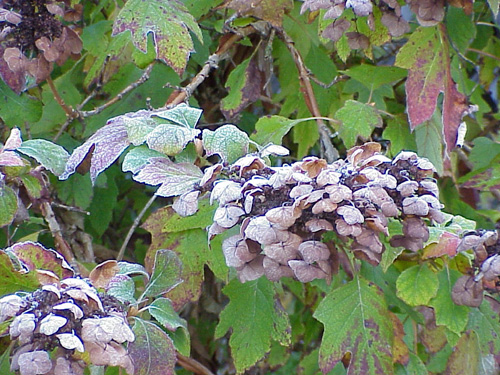
Autumn frost on hydrangea,
Estill Co., KY.
(photo: Sally Ramsdell)
November 1, 2021 Honoring Saints as Spiritual Resources
On All Saints Day we honor those who were striving in life to do the best they could -- and have now passed on to the Lord. Those who seldom think about the deceased find this a trying day; they may overlook an extended community that embraces those who died and those who live among us. To honor "saints" as friends and co-workers with the Lord is to be part of this real and wider community of those struggling on Earth, those who have not quite arrived and are being purged of wrongdoing, and those who have attained the Glory of Divine Presence in heaven.
On the day the first draft of this reflection was composed, our parish's 98-going-on-99-year-old matriarch and great, great grandmother passed from this mortal scene. In my last visit with her I thought she had months left, and yet she was praying for the great transformation to occur soon, very soon. Shortly after my visit she died peacefully from what could truly be called "natural causes." Virginia had been a pillar to our Church and local community, attending Mass when she could, remembering all in need through charity and verbal support, caring for relatives and friends, promoting parish benefits, serving on the board of the local hospital, and having the distinction of being one of the last one-room school teachers in our Commonwealth.
Virginia's presence is sorely missed, but is she really absent? Saints are with us, and we as Church testify to this on this feast day. People do not die and vanish leaving only a fading memory of their relationships and perhaps some audio, video, or written records for keepsakes. Rather, good people are now part of the community of the glorious, and thus shine before our universe like stars. They are not lifeless heavenly bodies, but real persons eternally alive to help us in some manner. They are part of God's company of companions who are near and dear to us in our present striving to follow them at the proper time.
Most of us will honor a chosen few with public signs of respect, such as attending a wake, or by offering flowers or money for their designated cause. We may be respectful enough to recall those nearer to us on anniversaries, and even offer prayers for them. However, do we ever pray TO them for guidance and assistance in helping us in our ongoing struggles? We could use all the help we can get in this troubled world, for our own incomplete journey is uncertain but saturated with hope. Their mortal journey has ended, but ours is still in process. They made it; they did not lose courage; they were faithful in completing the race; their crown is something that they humbly wear and want to share. It is important for us to ask a basic question: "Do we have friends who will intercede for us if we but choose to ask?"
Prayer: Grant us, Lord, to experience in some way the company of the heavenly hosts, and to understand that our departed friends are willing to intercede for us in the many ways we need assistance.
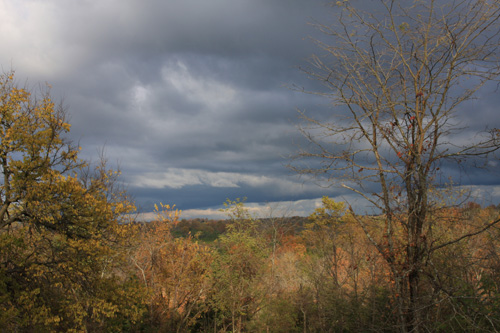
Skyward reminder of coming winter.
(*photo
credit)
November 2, 2021 Dying with Dignity
On this Day of the Holy Souls, we recall those loved ones who have gone before us. We reflect upon their passing, their incomplete journey often cut short by health conditions or untimely events. Many of us regret not being present at another's death or for not expressing compassion while they were with us. Note that in today's culture of death those advocating euthanasia regard that deliberate hastening of death to be a "dignified way" to go, rather than a suicide. We must muster the courage to say that this is a horrible way to end a well-spent life. We need not prolong the passing, but we are not the author of life and ought not shorten the length of this precious gift. In a meaningful manner, these final days can be a teaching moment for all who are near and a powerful way to offer sufferings for those who are in need.
We ought to seize the opportunity to say kind words to the dying, and even honor the custom of giving someone "permission to die," which is really taking leave of a person and saying that, while painful, this is needed for the betterment of all. Each of us must bow to God's will: the dying and those who must let go of them. We honor the gift of life and regret the separation, but we express hope of a future meeting in eternal life.
Hospice care has been a major godsend in this modern world. Controlling pain and a comfortable setting surrounded by loved ones are elements of what most desire when departing this life. Top choices of place to die in dignity are either the home or in a special hospice center; being surrounded by a company of loved ones is most comforting. Cheerfulness and dedication of hospice workers are key ingredients to an environment of a proper passing. Loved ones do all they can when natural events take their course. Cheerfulness in such circumstances is always a challenge. In the final hours recall aloud gifts that the dying person can be thankful for, since gratitude is the ideal atmosphere in which to take the final journey. God loves the thankful. We pray for accompaniment at the hour of death, and for added prayers in such trying times. Let's always pray for a happy death.
On this November day we can afford some basic preparation in the "inevitable" event of our passing: place of the funeral, wake and disposal details, person designated to conduct the services, songs, stories and other tokens of remembrance for wake or funeral service, choice of pallbearers and funeral directors, details of public viewing or its omission, and even elements of an obituary notice. Preparing these matters ahead of time is a blessing for those burdened by the short period between death and final services. Don't omit a listing of special relatives and friends who would feel hurt by being overlooked. If these details are assembled in an accessible place, a burden to loved one is lifted.
Prayer: Lord, help us to remember those in the stage of passing on, and to offer our services where possible by making a wake and funeral events of dignity for all concerned.

Pie make from autumn-harvest apples, a home-baked
comfort food.
(*photo
credit)
November 3, 2021 Challenging the Aristocracy of Wealth
We can have concentrated wealth in the hands of a few or we can have democracy. But we cannot have both. Judge Louis Brandeis
Is our democratic process ensured and our vote "free?" Have we arrived at a rude awakening that we have a somewhat hidden and unchallenged aristocracy that is deeply ingrained and desperate to continue its legitimacy? Are we unable to break the hold of that seemingly shadow-form of government because the power of hidden wealth controls media and thoroughly propagandizes our citizenry? Instead of being free, are we as a people following as told?
First, since laws were instituted to legitimize excessive economic resources that belong to all God's people, the wealthy have been able to be the grossest of tax cheats and store some 22 to 31 trillion dollars of wealth in secure places or tax havens. Their well-oiled propaganda machine allows them to distract the public on food stamp cheats or those buying soft drinks with their food stamps. To focus on the poor allows voters to omit the major concern, for the powerful culprits get away with little or no taxes on their vast profits. Hypocrisy at its utmost!
Second, the issue of fairer taxes is difficult, but has been largely overlooked by a voting public well concerned about who is to pay for their future. The idea of no new taxes when some are getting away without paying their fair share is hard for some to swallow, but this is overlooked by a public bent on what is the best for me and only me. The common good must be considered when it comes to taxes and the broader world. A purchased or stolen election or failure to address fair taxes will ultimately lead to insurrection as happened in history (e.g., after the Revolutionary War in 1792 with the Whiskey Rebellion). It could easily happen again with rebels having more lethal weapons than rustic farmers with muskets in the 18th century.
Aristocracy is in power only as long as the public citizenry accepts it. Certainly, such power is not from the hands of God, for the Scriptures speak out strongly for the poor and the rights of people to a proper livelihood. Does the democratic people see at this time that a shrinking middle class is due to the power of the large banks wealthy individuals to control sixty percent of American wealth, now in the hands of a few overpaid and undertaxed executives? Greed is behind these hidden aristocratic structures of what was intended to be a maturing democratic process. Continued monitoring of those elected to serve as legislators is of critical necessity. People are caught in the game of staying economically ahead and still forget to recognize influences that are at work limiting their opportunities. Are we prone to show wisdom in deciding or are we prone to follow false dreams? Besides electing legislators, we must monitor them with regard to equality.
Prayer: Lord, give each citizen the courage to speak up for redistributing the privileged wealth of this nation.

A sunflower, providing wildlife food and
self-sowing seeds for the coming year.
(*photo
credit)
November 4, 2021 Creeping Chernobyl and Piketon Worker Safety
For some twenty-seven years, the workers at the Portsmouth Diffusion Facility at Piketon Ohio (a major component of the U.S. atomic energy network) have sought a hearing on the human harm that has occurred to them over the years. Currently, there is a Federal Lawsuit with results soon expected. As to the nature and contents of that lawsuit, review our YouTube "The Creeping Chernobyl: Fraud Against Nuclear Workers and Community." In the video, Jeffrey Walburn and Charles "Chick" Lawson explain the grievances brought by workers and local residents; these seek both compensation for resulting injury as well as justice due to lack of proper safety management of the facility. Their massive documentation is now being used both in the lawsuit proper and as background to a future book.
This Piketon nuclear facility is where Russian surplus atomic warhead materials were recycled and ingredients returned for nuclear power electricity generation. This is not now functioning as a nuclear processing facility, but rather is being dismantled with alleged lack of safety in the current removal operations. In fact, the underground aquifers are possibly being contaminated by lack of care in removal of toxic heavy-metal piping contamination and waste discharges. The process lacks safety precautions.
We at Earthhealing have been involved for decades in this Appalachian problem (the most severe in the region), even when others ignored the issue. Our interest involved the work of our late associate, Mary Davis, who as an independent investigator uncovered a hint of what those who were inside the plant knew. Individual radiation dose records were being destroyed or doctored; responsibility related to medical monitoring of workers was in jeopardy for lack of sufficient evidence to obtain needed workers' compensation. Legally-mandated radiation dosage records had been conveniently lost or in a few critical cases doctored by plant managers more interested in their position than of worker safety.
Over three thousand workers were on the plant grounds when the first missing records were discovered a quarter of a century ago. In some cases, the harm to DNA could also pass on to offspring of the affected workers. The number of those affected is still growing as noted in the past two years, when local children have been harmed through the heavy metals released through dismantling of the facility. The nearby homes have been abandoned.
The cost of unchallenged bias. Why so long in coming? For years government officials at the Department of Energy and other agencies discouraged future inquiry by congresspersons on the grounds that the workers were a bunch of dumb "hillbillies," who did not know what was going on. The whole episode was very costly.
Prayer: Lord, may justice soon be done to those who have been hurt from mismanagement of the Piketon facility.
Being Collaborative
During November's weekends we will recall certain characteristics of Christian life, as the 2021 Church Year ends and 2022 one begins; these are collaboration, mercy, trust and gratitude. Now, during the middle of the UN Climate Change Conference (COP26) in Glasgow, Scotland (10/31-11/12), it is fitting to urge global collaboration and pray for its success, because working in a cooperative global level has never been tried beyond diplomatic endeavors. This unique call to collaborate in renewal is a challenge, with its goal being saving the planet. We focus on assuring that ordinary people endure rising ocean levels, shrinking ice sheets, and frequent severe weather conditions. Curbing climate change is a global challenge, with no clear guarantee that it will be automatically successful.
Limited individual efforts. Let's be honest; the track record of the first decades of this century is not perfect. In part, this is due to the power of Big Energy to extend fossil fuel use and favoritism, and our inability to cope with a rapid increase in global energy consumption. Renewable energy applications are coming at reasonable costs, but they are not coming fast enough. Yes, there are limits to what individuals can do -- though we must all be involved. Certainly we must simplify our lifestyles, recycle wastes, use renewable energy sources, and treat all creation with respect; we must acquire attitudes that embrace the entire human family, in a global effort to curb extremes of climate change.
Resolving to do more. It is not enough to say we live more simply; we must become intellectually and politically involved in renewal. We are called to propose and monitor green legislation and inspire legislators who must be committed to act urgently and with prudence. Saving our Earth is a social enterprise that takes willingness on the part of all. A rampant secularism is grossly harmful, for it is blind to realizing limits and barriers; likewise, secularism avoids the need for divine assistance.
Special efforts. It is necessary to admit that the global impact of pollution has various levels of contribution. The U.S., as an early heavy fossil fuel consumer, has a grave responsibility to contribute generously. Thus, this and other advanced technical nations must contribute an adequate share of expenses to curb climate change. This willingness in finances is absolutely needed for all to collaborate in an open and honest manner. The wealthier lands must be willing to accept moral responsibility, and do so at once. Postponement is wrong, for each day, with larger than necessary fossil fuel use, makes it all the harder to meet collaborative goals. Let's keep our responsibilities before us, and not move on to some less urgent issues. In 2020, the pandemic cut into fossil fuel consumption patterns, but they bounced back this year. What needs to be done is plainly visible; let's pray that we all have a willingness to renew our Earth right now.

Earthhealing Thanksgiving Report 2021
Our annual Thanksgiving Report finds the continuation of a global pandemic, aftereffects of January 6th insurrection, and recovery from March's one-hundred-year flood here in the Kentucky River Valley. On the positive side, we have had adequate summer rain for good grapes, berries and garden produce. Our local efforts include help to pandemic victims and encouragement of Farmers’ Market products. Thank heavens, the world nations are showing increasing resolve at the Glasgow COP25 Climate Change Conference. We are participating in Church Synod preparations. This work takes our continual resolve and collaboration at all levels.
Earthhealing projects continue with our Daily Reflections going to folks in 125 countries (with China consistently second highest viewers after the U.S.). Our YouTube channel has thousands of subscribers, and our weekly Facebook essays have faithful followers and lively commentors. I have co-authored a final book with photographer Warren Brunner, "The Gift of Appalachian Trees" (Amazon Books), along with now completing "Prayers through the Year." With God's grace, our Earthhealing work has moved forward, along with the blessing of good team health.
Amid all the current economic difficulties, we still support the principles of a Green New Deal. The world must move on to a no-carbon economy ASAP, along with an expanded set of renewable energy applications. Locally, we have sufficient solar energy captured on the parish hall on these grounds, and within sight of here is the new Berea College-invested small hydro plant, attached to the nearby Kentucky River dam. Our local people are becoming environmentally conscious, but all such measures take time. Our information services are more critical than ever, when directed to expanding renewable energy applications, domestic energy efficiency and resource conservation. To deliver these messages we need help, even while half of our current services occur on a voluntary basis. Your donation is most vital for the continuation of our work.
We are committed to raise environmental consciousness in whatever way possible; this includes regarding the local and distant world poor as true liberators with whom we seek solidarity. Besides normal expenditures, Earthhealing costs are rising due to higher gas costs, more response to comments and additional editorial requirements. Be assured that your donations are most welcome; they are tax-exempt when directed to "Kentucky Jesuit Missions." Thanks for helping us address environmental problems facing our world; this is our one and only opportunity to thank all of you for past support and beg for assistance in 2022. Yes, we have much to be thankful for this year, including your generous help.
Al Fritsch, SJ
316 5th Street
Ravenna, KY 40472

Colors of the Eastern poison ivy plant, Toxicodendron radicans.
(*photo
credit)
November 5, 2021 Remembering That the Voiceless are Hurting
We all have our busy schedules and are content to pass over a host of problems that do not directly affect us. That’s not the way it should be in our quest to be of greater service to others. The forgotten of the world have their problems and it is our responsibility to be on the lookout for them. Yes, the average person feels there are enough troubles in his or her or family life; for them, it is foolhardy to accept others' issues and especially those of folks at great distance. This is all the more true for people who follow news accounts that include famine, earthquakes and floods in foreign lands. Fast communications have made the neighborhood come ever closer. In order to be meaningful in charity and still not spread thin, the following may be helpful:
1. Budget a certain amount for charity of which the favorite group gets a sizeable portion.
2. Choose a region of global trouble to consider a focus point -- and preferably have a proven group with a good track record for giving assistance.
3. Reserve a portion of charitable funds for disasters that are unexpected -- and again pass funds through those with good track records for low maintenance and high pass-through of funds.
4. Consider living at a lower-cost lifestyle and direct additional funds to charity with a local lookout for those (elderly or disabled) who are forgotten. Often we have a connection with people who do charitable work as a living and will accept our generosity and make sure it gets to the right people.
5. Pray over the matter, for we may be asked someday why we neglected those who were in great need. The goal is to see others who hurt as Christ himself, and sharing compassion with him.
6. Realize that our intentions mean so much, for we are not perfect in what we do for others; hopefully, we will get better with time and experience.
7. Let's resolve that our responses hinge on our understanding of social justice. Those we help who are hurting may be better served by individuals and groups bent on reducing inequality and advancing employment opportunities of those who are overlooked.
8. We may cultivate a sense of uneasiness because of the injustice we see about us. Social justice is a needed component for healing our wounded Earth. All people have a right to share in the Commons and to acquire a means of livelihood.
Prayer: Lord, give our people wisdom and understanding, and help them find available time to think through with a clear conscience the way to make our charity and service meaningful.
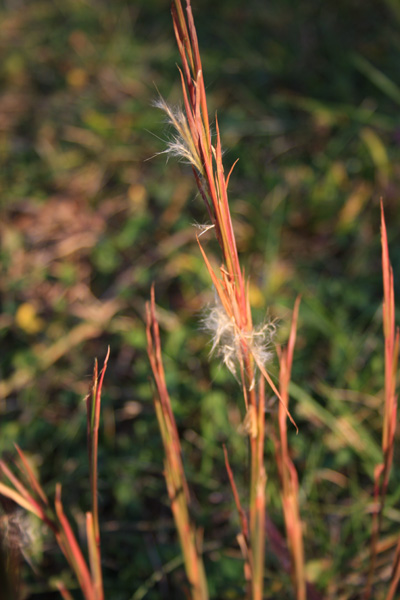
Grasses, dried in autumn.
(*photo credit)
November 6, 2021 Uprooting Our Selfish Tendencies
As we start to move away from the current pandemic, and we prepare for the upcoming holiday season, we ought to explore the selfishness that crops up among so many in our troubled world. Let's also recall that in times of extreme weather conditions the best of those seeking to be helpful emerges, and selfishness is abandoned by some, for brief periods during times of disasters.
Notwithstanding moments of cooperation, we have a darker side, which is the Ayn Rand approach to life in all its atheistic ramifications as found in "The Virtues of Selfishness." Perhaps it is a selective and ideological interpretation of capitalistic life, for ordinary selfish ways of many are popular. It may be one competitor getting ahead of another or a business dirty trick, or a person seeking to get what he or she holds is an "entitlement." It may be an elderly person scrambling to get more, or a person who is far back in the pack wanting to walk over others. Furthermore, it could be success of billionaires who help rewrite legislation and pay little taxes. Their selfishness becomes a national model.
Selflessness is championed by spiritual leaders. A host of passages both in the Old and New Testament deal with love of neighbor, service to our fellow human beings, care for those in difficulties, forgiveness of debts, encouragement to the dispirited, service to the stranger (Good Samaritan), proclaiming the Golden Rule, washing the disciples’ feet, and healing the infirm in numerous places. All of these testify to the demands on serious believers to be selfless people, and the more one acts selflessly the closer one comes to becoming godly.
Selfishness is exposed in all its ugly character in our world. Much has to do with individual monetary success and a road to one's own glory, at expense of others or simply overlooking the needs of the sorry hungry and homeless. This obtained or sought affluence is more often put in material terms and in monetary privilege. In subtle ways, selfishness could also be a practice of those aspiring for spiritual or ecclesiastical favors. Selfishness can be hidden and at the heart of efforts for renown or top position; it can be coated in terms of heroism or aspiration to become privileged. In every way it is worth reexamining in each of our lives.
Does spiritual selfishness exist? This can be the chosen moment to root vestiges of selfishness from our hearts. Over attention to self is not healthy; some prefer to omit self-examinations for fear of becoming too self-centered, and there is some merit to this caution. Through sensitivity, we learn the needs of others and return to self-examination when we find our limits to self-giving may have flaws attached.
Prayer: Lord, help us to give and not to count the cost, to labor for you in all it takes, and to leave what needs polishing in ourselves up to you, the master jeweler of the universe.
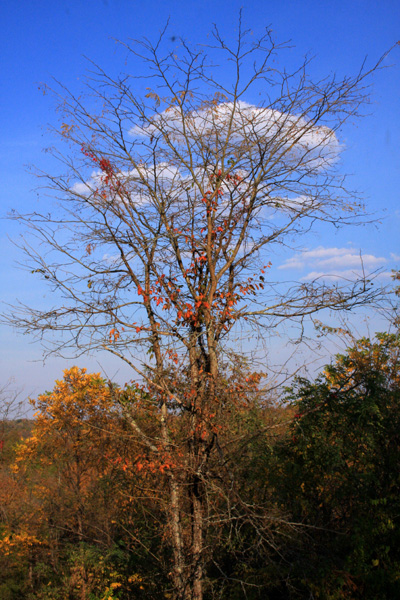
Brightly colored red and gold against blue sky.
(*photo credit)
November 7, 2021 Observing the Widow's Mite as Generosity
I tell you solemnly, the poor widow has put more in than all who have contributed to the treasury. (Mark 12:43)
We observe in today's liturgy that Jesus watches a poor widow giving from what she has to live on, though it is a mere small coin. Yet he regards her as the greatest of the donors, because it came from her need and not from her possible surplus. Jesus invites us to see the power of being generous, no matter how small the amount. The Lord counts things differently, or else the Widow's penny would not have been worth much. The constant need for good stewardship and resources to handle immediate costs triggers the search for high-value donors -- and thus poor folks are often overlooked. However, in the spiritual equation, their donations are of immense importance, a vital force in our world.
Radical sharing is at the heart of generosity, and yet we find it hard to practice, for it means to take from our surplus or even from what is our expected livelihood. When we were kids in the 1940s, we had small "Sunday envelopes" in which we would place our pennies (in depression times these were valuable, for each could buy a piece of candy). Tearing open and tabulating such small offerings would be tedious today, but the generosity being taught was immense. We all start by letting go of little things: our time, talents, thoughts, and our daily treats; we were parting with our tiny treasures. Jesus invites the rich man who has kept all the commandments to give up his possessions and come and follow him; in this case it appears to be too great an obstacle.
Proper and improper giving must be contrasted. Merely giving to proclaim one's name is all too often the result of peer pressure, desire for fame, or a subtle way to exert power. When billionaires give to effect change, that means they are the determining agent of change through the aristocracy of wealth, and this deserves confrontation in a democratic society. Proper giving is from the heart and not with the mind pondering the practical benefits of the gift given. Some say that altruism or selfless generosity is at the heart of being human -- though some forms of generosity may be practiced by animals as well.
Generosity is an ideal motivating force. Generous people become good teachers. In fact, if we believe in this power, it will create a ripple effect going out to all the world. Generosity is the true currency of authentic globalization, though we are unable to quantize it effect. The generous believe that benefits for the needy may or may not be ascribed to the giver. Let's encourage the power of being generous and to forget what our hands give. A society bent on monetary gain has much to learn here, and a simple widow who puts in her penny has much to teach as well.
Prayer: Lord, inspire us to give and not to count the cost, but rather to give because we can only truly show our love in this fashion, for you give so much to us.
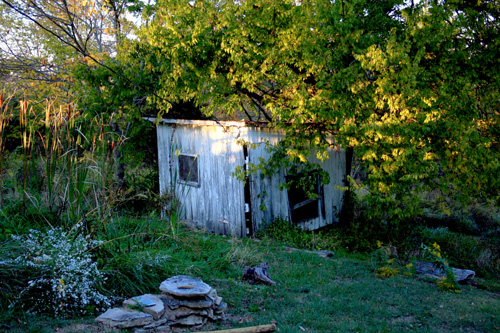
A once-productive henhouse.
(*photo credit)
November 8, 2021 Passing On and Passing Over
In high autumn, a season of passing glory, we recall that we use our English word "pass" both as noun and verb in countless ways. The word conjures up images of football plays, entertainment tickets, academic grades, geographic features, highway road trips, and vast theological imagery of the "Passover." Some of these pass words refer to avoidance (pass up) and others to success (pass through). Passing out refers to drunkenness or fainting or distributing, and passing away is the polite form of speaking of someone's death -- and this has deeper meaning than just not facing death by survivors. In fact, some may go through a death of a loved one and never use any terms but "pass" with a proper preposition. Let's focus on two: passing on and passing over.
Passing on is our manner of speaking about the person who was with us until recently, and now the contact is broken. Passing on is a polite way of describing death to the more sensitive, the passing on from a mortal to an eternal state for believers. However, the transition is colored by regret on the part of acquaintances. We can also speak of the year itself passing on amid actual or delayed frosts, and the loss of sensitive plants that have gone unprotected. Passing on seems a natural sequence, for natural forces play their heavy hand in autumn's passing.
Passing over has a faith-filled aspect of looking to the future, and not only to a past era now gone. Even the language of church funeral prayers bears this sense of moving from one state of life (mortal) to another state (eternal). For believers in the resurrection of the body, life is a passing over from one form to another. The "Passover" harks back to Old Testament themes of sparing those who are designated chosen people, traveling across the Dead Sea to the land of promise, and passing from old ways to new ones being memorialized each year. In the New Testament Jesus' Passover is observed as part of the Last Supper and beyond, and so Christians celebrate the Passover event on Holy Thursday. When applied to each individual, this means that mortal death is a metamorphosis, a passing over to new life. Now sadness turns to joy through a future transformation overcoming a past limitation.
Passing into high autumn bears both the mark of a passing warm season, and a passing into winter sleep after which spring will surely follow. We are once more reminded that we are not owners of our time, only ones who use it well or badly. Future hope stretches beyond passing seasons, even for those who enjoy likeable vacation times that pass too fast. For those who await a new transition, there is the hopeful anticipation; for them, there is no definitive abandonment but an eternal life ahead, a home yet to be realized and awaited with spiritual joy. With time we gradually see passing on giving way to passing over. Eagerly we await the passing into eternal life.
Prayer: Lord, teach us to learn to leave the old behind and to prepare ourselves for a grand passing over that is soon to come.
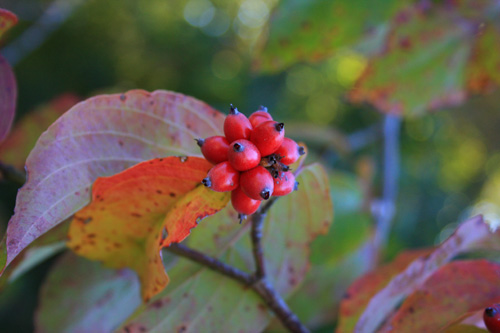
Berries of the flowering dogwood, Cornus florida.
(*photo credit)
November 9, 2021 Controlling Guns and Ammo: Why Private Arsenals?
Looking back on a youth with violence everywhere (the Second World War) and immersion in a gun-bearing society gives me pause. Am I not part of a gun addiction, which afflicts all of us today? We need a response to the 4,000 to 6,000 rounds of ammunition that was purchased (apparently on-line) by the Aurora, Colorado shooter, a decade ago, and such purchases could still occur today. Violence breeds violence, and a nation that thinks it can maintain a delicate balance in a world of crazies is unrealistic in its assessment of itself. In America, the majority of the mentally incompetent are still able to acquire weapons (all but 844 of 35,461 "crazies" in Kentucky). Insecurities keep us "addicted."
In 1775, General Gage (the acting governor of Massachusetts headquartered in Boston), first sent his troops to disarm the angry colonists by taking over the communal gunpowder arsenal at Cambridge. Later that month of April he sent a second detachment twenty miles away to Concord where a common store of weapons and supplies existed. Colonists had private arms, but a common store of ammo was located in specific places. Hence the Concord battle that caused casualties and introduced the Revolutionary War. Guns and ammo were in the conflict from the start.
The founding fathers of the Constitution saw the need for security and thus the "right to bear arms." It is one thing to have a front muzzle-loader, but it never entered their minds that private citizens would have automatic weapons at their disposal. Why such immense private power in the hands of the imbalanced? A permissive society cannot make distinctions and see that rights admit to degrees of utilization. Thanks to the powerful four- million-member NRA, the awesome power found in possessing guns (and ammo) is virtually universal in this country (whereas Australia with a conservative government has brought reasonable controls after a 1996 terrible incidence of gun violence). In a similar period, America has endured hundreds of cases of massive violence -- and untold movies to titillate the mentally imbalanced.
Governments are created for the good of society. National legislators controlled by gun lobbyists and profit-makers seem paralyzed and helpless. Ought we do more than offer condolences for victims when inevitable tragedies occur? We have three hundred million weapons loose and about, which could never be totally collected. But it takes sophistication to make and fashion ammo for them. Why not control ammo and allow only two or three shots (bullets) per person per hunting season? When young, we had guns but little costly ammo, and target practice was delayed to better financial times. Control ammo! Outlaw ammo for automatics -- a perversity of a Second Amendment, which assumed both social and individual rights and duties. The "right to bear arms" is a limited social right. Let's demand proper social controls.
Prayer: Lord, grant us a sense of balance in weaponry and give us courage to voice this openly and freely to a gun-crazy society.
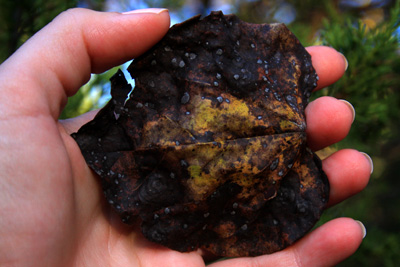
Colors of the faded Eastern redbud, Cercis canadensis.
(*photo credit)
November 10, 2021 Hearing the Call to Universal Fellowship
O praise the Lord, all you nations... (Ps 117:1)
This shortest of the psalms is a mere two verses that we recite or chant in morning prayer on a Saturday. Brevity makes us pause more than longer passages. All peoples should extol God's glory, for divine love is strong and divine faithfulness is eternal -- and should involve all the nations.
Service is individual action for the benefit of others. For one brief moment in our busy lives we think about the goal of our work, a love of God expressed in our steadfastness to give service to our neighbor; and service for and to others makes us more godly. Our service is often directed to people next to us, or to local neighbors; however, this service can be part of a global undertaking, a participation within the entire Body of Christ.
Selfless action is glory to God. The more selfless we can make this service, the higher the quality of the service we perform for the benefit of all. Thus, by removing self from the equation, our service, though often locally based, becomes participation in a global enterprise, both for others in social need and for our exploited Earth herself. In solidarity, we must enter into the process of saving our wounded Earth.
Faith is directed to an emerging glory. We believe that what we achieve in small ways will be a vital force, something we cannot measure quantitatively, like making money or acquiring material possessions. Faith realizes the potential value of helping others, no matter how small the service. It is not the quantity but the quality of the service, for in serving and wishing others happiness and good will, an often-hidden spiritual globalizing effect arises.
Nations can give glory. We need not limit our thoughts to what individuals can do. We operate in a community and thus communal service fits into the patterns of individual actions. However, each communal action can be a faith act hopefully presented through an act of collective faith. When governmental bodies including nations assist in our service role and help us serve others, then the nation assists in giving glory to God, whether expressing this in pious words or not. The degree of freedom for citizens to serve is of utmost importance. When injustice does not allow people a livelihood, a disservice has been given and the brightness of total glory is tarnished.
Nations can share fellowship. Communal service maximizes and encourages a deepening service of individuals, and the globalizing effects are enhanced. A global fellowship of maximizing citizen potential through their meaningful loving service is the goal of this short psalm; it is needed for global collaboration today.
Prayer: Lord, your love and faithfulness are eternal; help us to realize this in our lives both individually and communally.

A late-migrating monarch.
(*photo credit)
November 11, 2021 Respecting the Sacrifices of Veterans
As we age and reflect on the middle years of life and how meaningful these were, we come to Veterans' Day on November 11th and consider that one million Americans have given their lives for their country over 245 years. Most of these were young people in their 20s and 30s, with a sacrifice of what would normally be a lifetime of three or four times that length. Do we who remain at a distance from the voluntary military services give what they have done much thought?
Many of those who served their country and died for it could have developed excuses or gone into hiding and slipped out of the country. Instead, they were willing to say "yes" to love of land and prove it by taking risks and then sacrificing all they had to give. And second only to these heroic individuals were the millions who endured battle wounds, suffered, and still lived. Sometimes we take such sacrifices for granted and then consider putting our feet into their military boots for a brief time. Would we have liked to go through the vast uncertainty of trenches, blazing guns, bombs and diseases associated with soldiering in more difficult times?
I recall Clyde, a person who worked for us as a hired hand, telling us that every time his military unit was called to go overseas, he would go AWOL. After each recapture he went through basic training again and then would repeat the escape before being called to duty. He mentioned that twice the units he would have gone overseas with took heavy casualties; he said, "I'd rather be a live coward than a dead hero." Even as a kid I found this approach to military service as truly astounding; I wondered how we could have been successful in many of those conflicts, if everyone thought and acted the way Clyde did. In being confronted, he just laughed and said he will still above the sod, and that counts.
Yes, life is certainly worth the normal span of years, but what about supreme sacrifice out of love of country and home? In some way, we read about the battles and the loses of life and the thousands who died do not weaken the deeds of each individual who charged ahead in the face of possible injury and death. We would not like to have been in their shoes. An elitism can enter here. We, who are not veterans, have most likely never faced life-threatening dangers of warfare; at least today we could spend some time putting ourselves into the mentality and motivations of military personnel at times of crisis. Some of them were moved by the peer pressure of companions or the atmosphere of the struggle before them. Yes, they were willing to serve. Could I have done the same? There may be a little more Clyde in most of us, the ones who could not face the reality of a battlefield. On the other hand, at least we could add a measure of utter respect that so many sacrificed so much so that we could live in a more secure world.
Prayer: Lord, teach us to respect the sacrifices of others and to pause and thank you that we did not have to make such choices.
Being Merciful
On this weekend when we have celebrated Armistice Day, our minds go out to those who suffer from effects of warfare, along with the hungry, homeless, and those needing forgiveness and compassion on our part. St. Caesarius of Arles (468-542), a highly respected bishop in France from 502 to 542 said it far better than I -- and a portion of his sermon is worth repeating here:
"Blessed are the merciful for they shall receive mercy."
If one wishes to receive any mercy in heaven, he should give mercy on earth. Do we all desire to receive mercy? Let us make mercy our patroness now, and she will free us in the world to come. Yes, there is mercy in heaven, but the road to it is paved by our merciful acts on earth.
There is therefore an earthly as well as heavenly mercy, that is to say a human and a divine mercy. Human mercy has compassion on the miseries of the poor. Divine mercy grants forgiveness of sins. Whatever human mercy bestows here on earth, divine mercy will return to us in our homeland. In this life God feels cold and hunger in all who are stricken with poverty; for remember He once said: "What you have done for the least of my brothers, you have done for me." Yes, God who sees fit to give his mercy in heaven wishes it to be a reality here on earth.
What kind of people are we? When God gives, we wish to receive, but when He begs, we refuse to give. Remember it was Christ who said: "I was hungry and you gave me nothing to eat." When the poor are starving, Christ too hungers. Do not neglect to improve the unhappy conditions of the poor, if you wish to ensure that your own sins be forgiven you. Christ hungers now my brothers and sisters; it is He who deigns to hunger and thirst in the person of the poor. And what He will return in heaven tomorrow is what He receives here on earth today.
What do you wish for, what do you pray for, my dear brothers and sisters, when you come to church? Is it mercy? How can it be anything else? Show mercy, then, when here on earth, and mercy will be shown to you in heaven. A poor person asks you for something. He begs you for a morsel of food; you beg for eternal life. Give to the beggar so that you may merit to receive from Christ. For He it is who said: "Give and it will be given to you." It baffles me that you have the imprudence to ask for what you do not want to give. Give when you come to church. Give to the poor. Give whatever your resources will allow.
While Caesarius is a little hard on his audience, we would rather say, "if you have read thus far, we are deeply hopeful that all parties will be merciful towards the poor -- and may God be merciful to us." In this time when climate change is on our minds, we must realize that more of the poor will be unduly affected in the coming years. Mercy is enhanced by the urgency to act.

Home-grown shiitake mushroom, harvested after brisk autumn rain.
(*photo credit)
November 12, 2021 Gardening Year-Round without a Greenhouse
This reflection is meant for the gardener who lacks a greenhouse and still wants fresh, year-round produce. It helps if the climate is moderate and weather cooperates, especially in late summer when seeds are sown for winter crops. Obtaining garden produce in late spring to early autumn is not difficult; the problem is the non-growing season from first killing-frost to last freeze. These ideas help in planning for the 2022 garden year:
1. Don't delay. For winter crops, start sowing early (in our areas in mid- to late-August). In dry years autumn crops may require constant watering in order to sprout and survive.
2. Protection is key. Of course a heated greenhouse is ideal, but temporary cold frames could also prove of great value at far lower costs. For green crops growing into the autumn, use Remay or other cloth coverings that allow some air to circulate, especially during sunny days. Minimize air space above produce to reduce the space needing daylight heating to fortify against cold nights.
3. Think variety. A major goal is to have salad greens in all seasons. Choose autumn seeds well (mustard, kale, endive, arugula, Swiss chard, and turnip greens). Go easy on delicate greens, such as most of the lettuce varieties. Brassicas (broccoli, cabbage, etc.) are difficult to carry over through summer heat and bugs to autumn and winter produce; some sow again in late summer or grow plants for autumn. I like South's favorite brassica, collards.
4. Include wild varieties. We forget that dandelions can furnish leaves well outside of spring when under leaf cover. In winter, chickweed grows well in covered areas. Also, in various seasons consider plantain, poke, sorrel, and lemon grass.
5. Remember root crops. A variety of these can endure some or much of the winter including Jerusalem artichokes, salsify (oyster plant), Japanese radishes, some types of garlic, horseradish roots, carrots, turnips, onions, and parsnips.
6. Herbs make variety. Not all herbs are year-round, but some mints are green for many months. Parsley grows well both outdoors in summer and in indoor potted plants along with dill, basil, and others. Garlic in a green blade stage has a long growing season.
7. Respect warm weather varieties. Don't try to grow peppers, beans (peas do very well though), tomatoes, cucumbers, squash, or okra in cooler weather. They like it warm.
8. Control micro-climate conditions. Keep track of how the various types of produce endure the extremes of heat and cold. It may be necessary to protect summer crops with artificial shade.
Prayer: Lord, give us the creativity to garden wisely and the expertise to spice our lives with variety throughout the year.
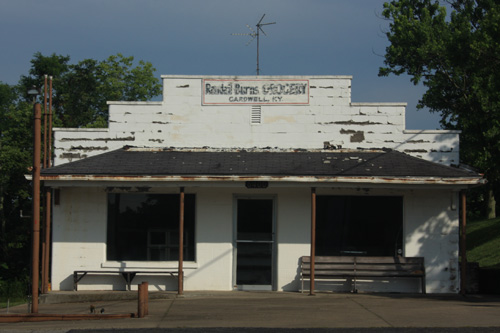
Small town market, Cardwell, KY.
(*photo credit)
November 13, 2021 Championing the Nobility of Poor Citizens
We may be tempted to speak of the "filthy rich" in a pejorative manner. We might also be tempted to regard the rich as "nobility," but use this term to mean privilege without duty. However, this is a misuse of a term for it is far removed from the stance of medieval wealth and power, along with sacred obligations due a person of public rank. The earnest medieval nobles gave service to kings and princes with civil and even ecclesial penalties that were associated with misuse of that power.
Let's take that noble sense of nobility and relate it to the actions and insights of all responsible citizens including the poor. It takes nobility to become disciplined enough to expect to share the resources of the world with all citizens. The poor learn to pray with sincerity and honesty, "Give us this day our daily bread." Realizing that we can thank God for gifts given allows that deep sense of gratitude wherein we find our humble but noble position before the Creator without pretensions.
Responsibilities by the poor do not necessarily include thanking the wealthy for what is rightfully ours as poor folks. The patience to continue to remain lowly while the privileged remain in their wealth is not virtue -- only a lack of courage to challenge an unjust condition of inequality. For too long some religious teachers have talked about patience as a virtue to be practiced by the poor. We do not have to exercise patience when we see that in doing so can lead to an unstable revolutionary condition by those who lack essentials. This is why "patience" that tells of staying in one's current lower status is quite misleading; it is a form of desecration of the sacred rights of all people to basics of life. We can become impatient when Christians fail to follow Jesus and refuse to overturn the privileged tables.
True responsibility rests with accepting our duty to motivate and enact all to take what is meant for their livelihood -- provided they do so non-violently. It is our duty to overturn tables of the world's moneychangers, to upset those who have taken from the Commons what belongs to all people, and have turned this treasured but vulnerable Earth, our Father's house, into a den for wealthy thieves. Jesus teaches us to take matters into our own hands when others are reluctant to do so. We must be of one mind and this takes a noble responsibility of not being sidetracked by division, but living in solidarity with others.
Nobility comes in many forms. We are often blind to the failures of a privileged class and need the outlook of our American revolutionary forebears. Further, we ought to see the more noble demands of care for others, and find nobility among the poor and work together in addressing their neighbor's needs.
Prayer: Lord, give us the wisdom to see potential in the poor, not in a permanent groveling state, but in readiness to change the world for better -- a state of shared citizen empowerment.
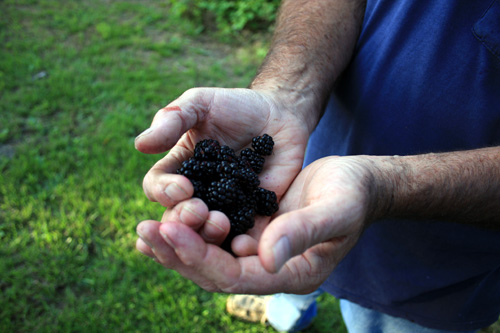
Home-cultivated blackberries from wild bushes.
(*photo credit)
November 14, 2021 Seeing Climate Change as Sign of the Times
We are coming to the end of the Church Year and the liturgy continues November's meditations on the last things (death, judgment, heaven, and hell). On this 33rd Sunday in Ordinary Time we focus on signs at the end of the world and apocalypse. This is not our favorite subject but deserves an occasional word. It goes beyond detecting weather signs, though we recall in several Gospel passages Jesus urges us to observe the weather accurately and realize what is expected to occur. Weather is not climate, nor can our fairly accurate prediction of tomorrow's weather at the local level predict next year's or a longer-term climate change:
* Tomorrow the signs show that it will frost;
* Winter is coming and days are getting shorter;
* Higher oceans are happening and will continue.
All three of these observations are worth noting, but from different sources: the first is our common sense experience with weather; the second is from forecasters who are right most of the time using state-of-the-art observational practices; and the third is from authentic and respected climate scientists and their analyses. Prudence requires us to listen to all three.
Apocalyptical alarms have limited value and must be interpreted properly. Overuse turns people off; vivid descriptions disturbing the mentally unbalanced; those needing lifestyle changes find discomfort -- but maybe for the better. People are free and some read and hear of signs and yet continue hurting their own lives. However, signs of the times deserve seasonal observation and reflection, but drawing immediate conclusions from them is not always obvious. Certainly, if signs show impending global problems, we must change our ways, and prepare to confront the issues with proper attitudes. The global warming alarm requires a cautious approach, not panic, for "Fire" is a rare warning.
Severe weather has struck in recent years in the form of floods, hurricanes, drought, and severe winters: too much or too little water, too much wind or too cold or hot. A decade ago, a National Geographic had an entire section entitled "Weather Gone Wild" (Sept. 2012, pp. 30-55) with a telling chart of severe American weather causing damage of one billion dollars or more ($329 billion from 1980-95 and $541 billion from 1996-2010). Since that time the damage has increased. Reading the signs of the times is worth our efforts in areas of both common sense weather observations and expert warnings. Let's use urgency and caution, but proceed to work with diligence and a sense of interior peace of soul, knowing that God is in charge; however, we are responsible to follow the prompting of the Spirit in saving our wounded Earth. Signs are not to be ignored for they speak to us individuals, our communities, and our Earth herself.
Prayer: Lord, clarify our understanding of justice in these times; give us the courage to change our ways, to adopt temperance in our actions, and prudence to effect these changes ASAP.
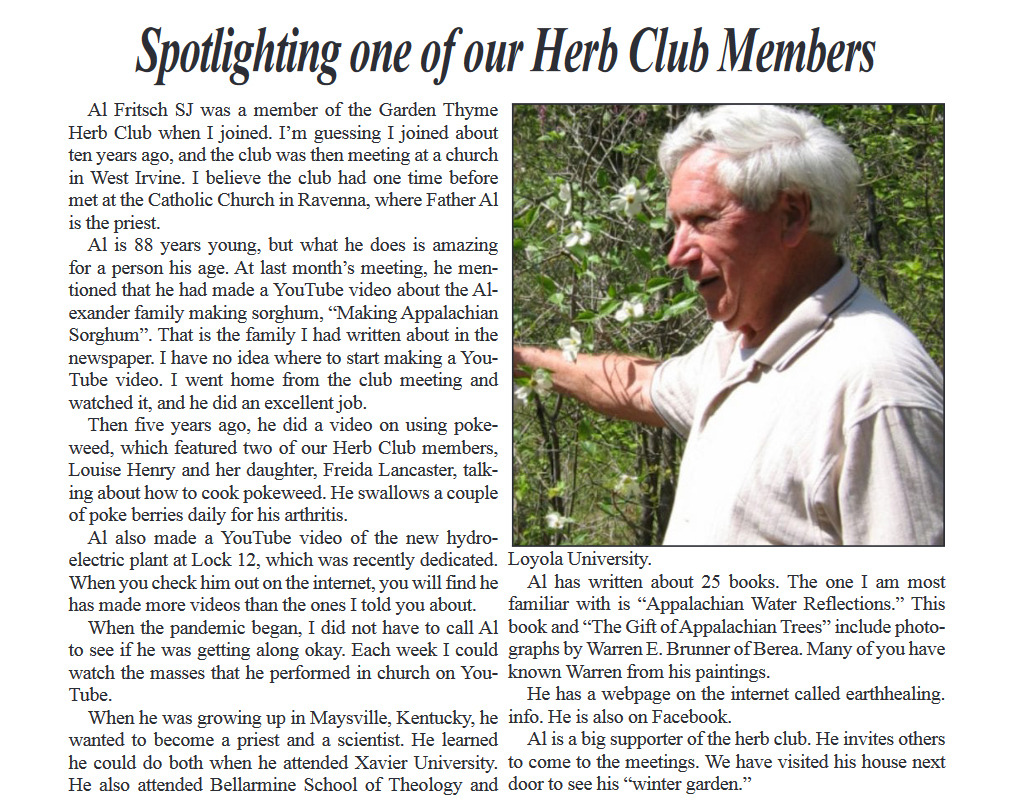
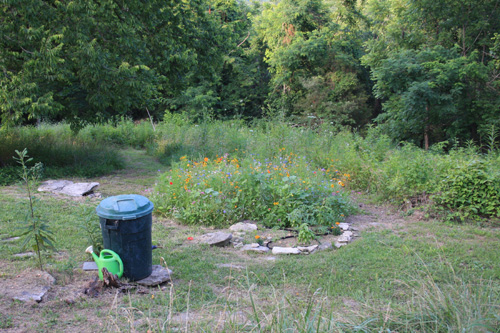
Rain barrel to store and supply water for small garden plot.
(*photo credit)
November 15, 2021 Affirming Renewable Energy Generation Capacity
Each year over the last five decades of environmental writing, it has become easier to foresee the emergence of renewable energy in the production of electricity. Renewable energy sources (solar, wind, hydro, geothermal, tidal and some biomass) are steadily entering into the grand electricity generation mix in the U.S. and most other industrialized nations. According to Federal record-keeping, more and more of the total capacity has moved away from coal, petroleum and even recently cheaper natural gas and in many recent months filled almost totally by renewable energy sources, especially solar and wind. The renewable capacity is changing.
The U.S. non-renewables are slowing down or ceasing to bring on new electric facilities to replace aging ones. New nuclear sources have almost ceased due to high costs, long construction time, and lack of final disposal sites for waste materials; all the while, several plants are being denied license renewals. Further, there are no new coal facilities and rapid closing down of existing ones is occurring; coal as fuel has gone from 40% of fuel used at the turn of the century to below 20% today and rapidly declining further. While natural gas has been the bright intermediate fossil fuel due to low-cost fracked fuel, still the efforts to eliminate greenhouse gases are working against it; both escaped methane from the natural gas and the carbon dioxide emission products are detrimental to a carbon-free goal in the next decade.
These trends are in keeping with studies showing that the future American electrical generation picture is changing rapidly, from that of heavy dependence on dirty coal-fired power plants to natural gas and now to renewable ones approaching a quarter of the total electricity generating capacity. With the advent of more and more electric cars, the generation of electricity will continue to grow, even with enhanced fuel energy efficiency. Much of what is needed for auto battery charging can come from solar arrayed parking facilities and from domestic housing solar arrays.
The rapidly changing energy-source utilization makes it difficult to project a future picture in 2050. However, much depends on whether renewable energy sources receive equal favor to the non-renewables and also additional incentives for further development. The new Administration is giving a green light to advances in renewables, and this cannot come any too soon. Several of the renewable energy mix have bright futures, including geothermal and tidal. Hydro is being tapped by enhancing existing small dam facilities. An ability to transmit off-shore wind power to various parts of the total system is what many foresee as the potential for strong renewable's growth. Wind does not pollute the air, takes no water, can come into production fairly quickly, and is falling to or below competitive price ranges with fossil fuels.
Prayer: Lord, teach our people to focus on renewable energy sources and to do so in order to curb climate change and reduce greenhouse gases.
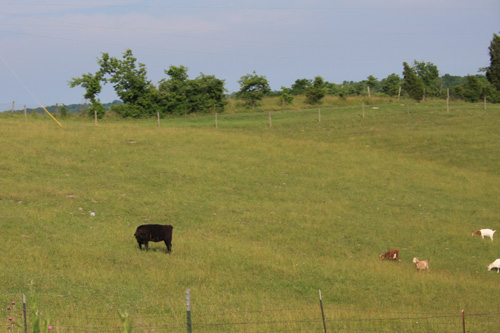
Livestock, grazing in pasture.
(*photo credit)
November 16, 2021 Tolerating Damage to Earth?
This is why the country is in mourning,
and all who live in it pine away,
even the wild animals and the birds of heaven;
the fish of the sea themselves are perishing. (Hosea 4:3)
On this International Day for Tolerance we must distinguish those for whom tolerance is due, along with issues and conditions which should not be tolerated -- because they hurt others. Tolerance does not mean we must be wimps. We tolerate people; we do not tolerate their social misdeeds unless they are so personal to us as a single individual that we accept them. If their misdeeds are not directed to us individually but to our neighbors, we must speak up and defend our brothers and sisters who are being hurt. This sense of watchfulness and refusal to tolerate misdeeds also extends to Earth herself. We do not tolerate polluting actions in some sort of misguided sense of acceptance.
Amid the nakedness of our landscape where misdeeds are so blatantly observed, we ask ourselves questions: Are we in touch with damaged landscape, or do we flee from the sight of something that is painful to view? Doesn't it take a deeper spirituality to perceive suffering and accept our role as being willing on occasion to show anger for harm done to our Earth? If we choose to stop and listen for even brief periods, do we stand in silence and feel and hear the sobbing of the countryside? Are we deeply touched and moved to action? Does the Earth herself mourn, demanding our stamina, concern, compassion, and the grace of hopeful renewal to resolve to do something to bring about a change?
Coming to an awareness is insufficient; we must act to reduce the suffering, stop the pining, and put an end to the perishing of the land's species. The task before us is immense and demands courage. We are called both to be passively present to suffering and to make our presence felt in very creative ways; we are drawn to resolve to confront environmental abuse. Like Jesus who was both merciful and angry, we are to develop a more perfect and balanced interior ecology. Then we will confront the crisis of climate change and work to find and implement solutions that work.
Two aspects of an eco-spirituality include first a call for ultimate action by knowing the HERE and NOW through immediate observation -- how deep the damage is and why it cannot be tolerated. The second aspect is to join in community with like-minded individuals and groups, the WE, to bring about change at the grassroots level. This sense of grassroots, reaching beyond our local concerns to being global partners who work together; this is a key to eco-spirituality today. Compassion demands public action, letters, demonstrations, gatherings, marches, organizing, encouraging others, writings, and prayers.
Prayer: Lord, teach us that we have a mission to do with others, and give us the courage to do something to halt damage and initiate improvement.

November leaves on deciduous trees remain green only for a short time in
Kentucky.
(*photo credit)
November 17, 2021 Enduring Another Hot Year
Need we complain about how many days the mercury went above 90 degrees -- or in some places 100 degrees Fahrenheit? We know our own little world and personal experience, and hear from more and more sources that this is a global phenomenon -- especially in the Arctic regions with record-melting of ice sheets. Measurements are now proving the rising temperatures and record ice-melting at both ends of the Earth. Glaciers are rapidly disappearing and these have been sources of water needed for irrigation downstream, especially in South Asia. Gradually, the oceans are rising and will soon flood areas where millions of people make their home.
Each of our recent years has begun with hopes and expectations of harvests that will feed a growing world population. Excessive heat can also be exacerbated by drought in parts of the world where scarcities can happen. Dr. James Hansen (mentioned in our previous reflections on global warming) co-authored with colleagues a paper for the Proceedings of the National Academy of Science, showing that what was normally unusual in weather patterns is now normal. The team performed a statistical analysis using data for 60 years. That decade old report has been proven by recent data as well.
This data divided the planet into cellular units of about 150 miles and compared decade long blocks of average surface air temperatures. They created a reference summer temperature value from the years 1951-80 in the Northern Hemisphere and then calculated deviations for each decade. These are standard bell curves with peaks moving to the right with each decade showing acreage temperatures inclining to the hotter side, as many of us have already become aware. The more general statistics are bearing out what we already know -- except for the agenda of merchants-of-doubt's constant attack on increasing scientific evidence of the human causation of global warming/climate change.
Issues of doubt add to prolong the period of fossil fuel use to the benefit of energy profiteers and virtually no one else. For those desiring controversy to please advertisers, the die is cast that there is doubt here, and this gives entre to fossil fuel managers as though they should be allowed equal time to defend the status quo. Renewable energy alternatives demand an equal playing field and then additional subsidies in order to hasten their acceptance as non-polluting alternatives. Advances in energy efficiency measures must also be supported at this critical time.
Should we tolerate foot-dragging related to climate change practices that create billions of dollars in profits for fossil fuel pushers? Oil is an addictive substance, as is dirty coal and natural gas. The longer cigarette smoking went unregulated after proven cancer causation in the 20th century, the more profitable the status quo practices. Hot summers lead us to advance all forms of renewable energy (wind, solar, hydro, geothermal, and tidal).
Prayer: Lord, give us the courage to know what to do and act.
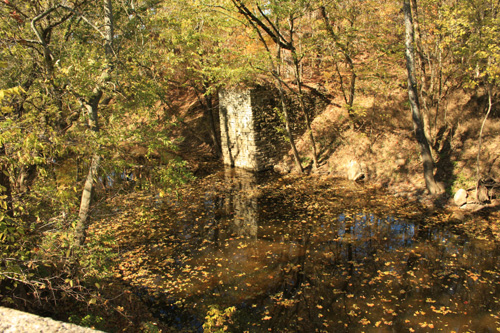
Remnants of the Kirkwood Pike covered bridge spanning the Salt River, Mercer
Co., KY.
(*photo credit)
November 18, 2021 Recalling the Sensational Aromas of Autumn
I have essentially lost my sense of taste and smell, but do remember the efforts that Warren Brunner and his wife Pat gave to our joint book: Appalachian Sensations: A Journey through the Seasons. The Brunners have assembled a host of photos for each of the twelve months and each month has a series of topics related to sight, sound, taste, smell, and touch. To these 60 possibilities I related narratives and Scriptural quotes to assist the viewer to appreciate the glory of our region through the seasons. With memories fresh of seasonal aromas, we selected a few:
* Rotting leaves after a soft rain that vary according to the type of leaves. This return to nature is truly an autumn experience which I miss very much today;
* Those last roses of summer and flowers that have suffered in the frost but still have a scent. I always would treasure what could be protected and still give a hint of a past growing season;
* Walnuts freshly hulled with that iodine smell and the stain with residual remembrances;
* Silage for hungry livestock with a touch of alcoholic fermentation from the corn and sorghum -- and they would be so very anxious to get to the feeding trough;
* Freshly-shucked corn with its distinctive faint scent and fuzzy silk and yellow sheen on the new ears. This only lasts for a short while during the shucking process;
* Piping hot pumpkin pie right out of the oven and inviting a taste as well as smell. Really the same could be said of the mincemeat pies and those made from squash and proper spices added;
* Steaming cider with the cinnamon stick that adds to the warm atmosphere within a world of cooler weather;
* Tobacco being brought to the warehouse for auction (a rare sensation today, but one that was far more pleasant and beneficial than when the product was smoked, chewed, or snuffed);
* Hay in the hayloft on a snowy day that gives contentment and peace to a harsh environment;
* Wood smoke permeating the countryside that may be polluting and yet contains happy memories as well;
* Firewood freshly split and prepared for drying before use in the fireplace;
* The telltale skunk odor on the inquisitive pet that can be removed by a little tomato juice;
* Pine needles on the morning walk with a special smell that makes us refreshed by feel and sight as well;
* "Cracklings" being prepared for rendering into lard in the midst of hog-killin' season;
* Turkey being carved at Thanksgiving -- and the stuffing or dressing depending on one's part of the country, all with distinct herbs and spices; and
* Purple turnips freshly dug that subtle earthy aroma that can be easily overlooked.
Prayer: Lord, thank you for giving us at least for a time the sense of smell and all the many memories that go with it.

Earthhealing Thanksgiving Report 2021
Our annual Thanksgiving Report finds the continuation of a global pandemic, aftereffects of January 6th insurrection, and recovery from March's one-hundred-year flood here in the Kentucky River Valley. On the positive side, we have had adequate summer rain for good grapes, berries and garden produce. Our local efforts include help to pandemic victims and encouragement of Farmers’ Market products. Thank heavens, the world nations are showing increasing resolve at the Glasgow COP25 Climate Change Conference. We are participating in Church Synod preparations. This work takes our continual resolve and collaboration at all levels.
Earthhealing projects continue with our Daily Reflections going to folks in 125 countries (with China consistently second highest viewers after the U.S.). Our YouTube channel has thousands of subscribers, and our weekly Facebook essays have faithful followers and lively commentors. I have co-authored a final book with photographer Warren Brunner, "The Gift of Appalachian Trees" (Amazon Books), along with now completing "Prayers through the Year." With God's grace, our Earthhealing work has moved forward, along with the blessing of good team health.
Amid all the current economic difficulties, we still support the principles of a Green New Deal. The world must move on to a no-carbon economy ASAP, along with an expanded set of renewable energy applications. Locally, we have sufficient solar energy captured on the parish hall on these grounds, and within sight of here is the new Berea College-invested small hydro plant, attached to the nearby Kentucky River dam. Our local people are becoming environmentally conscious, but all such measures take time. Our information services are more critical than ever, when directed to expanding renewable energy applications, domestic energy efficiency and resource conservation. To deliver these messages we need help, even while half of our current services occur on a voluntary basis. Your donation is most vital for the continuation of our work.
We are committed to raise environmental consciousness in whatever way possible; this includes regarding the local and distant world poor as true liberators with whom we seek solidarity. Besides normal expenditures, Earthhealing costs are rising due to higher gas costs, more response to comments and additional editorial requirements. Be assured that your donations are most welcome; they are tax-exempt when directed to "Kentucky Jesuit Missions." Thanks for helping us address environmental problems facing our world; this is our one and only opportunity to thank all of you for past support and beg for assistance in 2022. Yes, we have much to be thankful for this year, including your generous help.
Al Fritsch, SJ
316 5th Street
Ravenna, KY 40472
Being Trustful in God
Trust in the Lord forever! For the Lord is an eternal Rock. (Isaiah 26:4)
As active Christians, we are committed to personal and group salvation; we are called to have compassion for those who lack essentials in life. We become aware that spiritual egotism has no place in Christian life. Yes, we need to look out, lest the Almighty Judge will say we did not see the hungry and impoverished. In this age of growing global consciousness, Christians look beyond family and neighborhood to a broader world portrayed in part through our modern social media; we are called to help save, preserve and renew our wounded planet.
Trusting Ourselves. As children, we dreamed of a world of possibilities; with time we saw that barriers stand in their way. We may be headstrong and deny these barriers, or excuse ourselves and shift responsibility to others, or escape to allurements that distance us from problematic barriers. Or we may overcome temptations and take up our responsibilities. While growing in awareness to participate, we are equally conscious of individual limitations and imperfections. Our eagerness to try does not guarantee perfect action, only some sort of action. Thus, we discover that participation with others is needed for genuine improvement. Realistically, in order to improve we must reach out to a broader society with its expertise and moral guidance -- or we can persist in being struggling lone rangers.
Trusting our Society. Limited individuals may become aware that it is time to link with others, but even our trust in them has its limits. We can save our world together, but difficult barriers still exist and must be addressed. Pie-in-the-sky plans do not automatically fall into place. Part of being realistic is to know that evil exists and some are in its clutches. Individually, we are immersed in a society filled with secular pursuits -- greed, selfishness, personal pride. We avoid that evil but still act meaningfully in spite of its presence. Evil and terror lurks in an imperfect world, a reality that cannot be wished away. We are willing to strive to succeed using all forces at our disposal, physical -- and spiritual (a reality the secularists fail to acknowledge). We confront a secularism that pretends to form an all-powerful global force; in contrast we accept our need for a Higher Power, something that ex-addicts can teach us well.
In God We Trust. Our national motto was born within a revolution against a strong military power -- and the willingness to ask for divine assistance in securing our independence. Fast forward to now: never before in human history has a goal been so dependent upon our collective global action. We shudder at the responsibility to act together, and thus we reach out for divine assistance following the words of St. Paul, who said that "when I am powerless, it is then that I am strong." We trust that God will empower us to act effectively.

Friends. Enjoying wetland created with liner from recycled tires. (Green frog, Rana clamitans).
(*photo credit)
November 19, 2021 Recycling Old Tires in Different Ways
In America, casting off tires amounts to well over one tire per person per year. Reducing this waste product by extending tire life on vehicles could become a major resource conservation and environmental measure. In our safety-conscious society auto tires are replaced at a fast clip -- and the problem is what to do with discards. Personal uses run out fast, because the old tire swings tied to the branches of trees were a common sight in depression days, but not seen often today. Using tires for holders of potted flowers or even vegetables such as sweet potatoes are rare and limited. Even gardeners can only stack so many tires and afford layer after layer of potatoes with each new ring. Such a practice is a rarity. Fashioning tires into sandals is known in poorer countries, but few like to resort to this recycling gimmick today.
Actually, a utility of old tires in large numbers and with great benefits is now hitting the market, namely use in road-paving materials. The tires are shredded and particles are inserted in the binding materials of asphalt with actual improvement in durability. Reusing old tires in such a utilitarian process has numerous benefits and advantages:
* Removes solid waste disposal problems since these bulky tires can fill landfills rapidly and remain long uncomposted;
* Reduces noise pollution by paving roads with old tires as part of the paving materials. Engineers say that use of such materials cuts traffic noise by 25% and results in quieter roadways. Reduced noise means reduced discomfort, stress, and even heart attacks. Technically speaking, tires help thicken bitumen binding and allows for larger air bubbles that soften sound;
* Substitutes for expensive constructed road barriers that have only limited effects on windy days and are an eyesore for many residents who don't want to live in walled enclosures;
* Replaces extra primary asphalt materials with savings in energy and resources. Bitumen is an oil product and this raw material when utilized adds greatly to paving costs; replacement of a certain amount by old tires reduces fossil fuel use;
* Lowers paving costs as discovered in America (20,000 lane miles per year now being repaved) along with extensive and increased use in China, Germany, Brazil, and Spain.
Competition is brewing even as tires get further road-paving use. Future materials for paving using a polyurethane plastic in road building is adding basic rubber as a key ingredient -- though the product is expensive and may have a heavy carbon footprint.
Prayer: Lord, teach us to use the good things we have and to reuse them when opportunities permit.

Lattice atop fresh wild berry pie.
(*photo credit)
November 20, 2021 Sharing Our National Gifts
In some final remarks by Gore Vidal before he passed from this mortal scene, he spoke gravely about the decline of the United States. His own physical decline, yes; America's, perhaps or perhaps not! Another way of viewing current trends is to see that we can wake up to our consumerism, multitude of advertisements, and enormous per capita resource wastes; the U.S. could take on a far different leadership so needed in a pandemic-stricken world today.
We can become leaders in global collaboration through our national experience with democratic federalism. We should reflect on what has made us a nation and able to work with a variety of races, motivations and cultures -- even though we have not done a perfect job over the years. Maybe we could incorporate models from the national experiences of Switzerland, Australia, Canada, and others where our land has had flaws. This leadership is not in competing and over-excelling over others, but of acting as a sharing neighbor to help ease travel from place to place, to advance financial and commercial advantages, to share burdens such as drought or flood damage, and to obtain mutual security that is so necessary in this conflict-prone world. Sharing success and supporting clusters such as the European Union, the African Union, or the association of Latin America countries is proper from a nation of fifty states with their own ways of doing many things not specifically spelled out in the U.S. Constitution.
The U.S. federalism was a brilliant insight, but did not come to full fruition until after our bloody Civil War ended slavery. However, by extending voting (propertyless males, blacks, women, Native Americans and 18-year-olds) we gradually incorporated more folks. Civil rights struggles are still in process. Vast diversity of wealth, existence of hunger, and failure to gain resource independence are all part of our unfinished business that requires additional legislative effort. Challenges still facing us are formidable both at the national and global levels.
All things considered, we Americans have a national learned experience to share with others: national security measures, good governance, highway maintenance, weather forecasting, space programs, communications devices and technology, agricultural techniques, academic research facilities, and medical advances, a Peace Corps, and a global military establishment willing to help in times of global emergences. In none of these areas is the U.S. perfect, but it does have a functioning homeland security, rapid communications, a good highway system and highly sophisticated research facilities. We suffer from a lack of proper social network in health issues, a fair tax system to limit aristocratic wealth, and a global control over tax havens. We need to be more willing to share the gifts we have as part of global security. Our vulnerable democracy needs watchful guarding -- and sharing.
Prayer: Lord, teach us to share experience in humble ways and to see that we must collaborate within a troubled world.

White-lined sphinx moth (Hyles lineata).
(*photo credit)
November 21, 2021 Coming of the Kingdom and Our Participation
"I am the Alpha and the Omega," says the Lord God, "the one who is and who was and who is to come, the almighty." (Rev. 1:8)
On this feast day of Christ the King, we focus on the Kingdom of God, not the kingdoms of this world's power brokers. We pray that the Kingdom of God comes and that God's reign is triumphant. Too often we reflect on just how far we are from the fullness of that Kingdom. History moves on, but so slowly that we lose the picture due to immediacy of current needs, with all their risks and benefits. A longer view shows a growing awareness of an emerging world order where peace and justice have opportunities to emerge.
The Kingdom of God is a work in process, of people coming together and respecting the rights of others, of doing away with slavery, of tackling immense poverty, inadequate health care, and homelessness that plagues so many, of addressing conflicts demanding joint international action, of climate change practices worth tackling through global collaboration, and of removing tax havens that allow escape from tax responsibilities. The United Nations functions amid its challenges and does its part in the coming of God's Kingdom. We pray that we be more than bystanders; we are called to be participants in bringing about the Kingdom.
We are the agents of change who must catalyze the process of establishing the Kingdom. We are like yeast in the dough, small points of light, human catalysts. This means we must be at the right place and with such stability that we can endure the change process. We must hasten the Day of the Lord because we believe in God's reign and are dissatisfied that it has not yet come to fruition. Come Lord! This is our refrain and it gives us strength to act as ever more effective agents of change in this time. God has given an awesome mission to his Church to serve as catalytic agents of change by working as units in cooperative endeavor. We are not in charge of the coming reign (God is), but we have been given an illustrious role of acting in the world to bring about that change -- to hasten the coming of the Kingdom.
Our prayer has various nuances: we pray with a vision that an imperfect Kingdom will be realized in its fullness and that Christ is seen as king of all the Earth; we pray that we are part of this effort and see the needs that are ahead of us as being so urgent that we take part to the fullest degree possible; we pray that we can work together with others to bring this about. Thus, there is a multiple aspect to our prayer: knowing the situation in its full ramifications; realizing our need to enter into the urgent work before us; seeking courage to unite with others to serve as effective agents of change; and a sense of hope that God's Kingdom will triumph in the near future.
Prayer: Lord, we pray again the Our Father with special emphasis on the words "Thy Kingdom come."
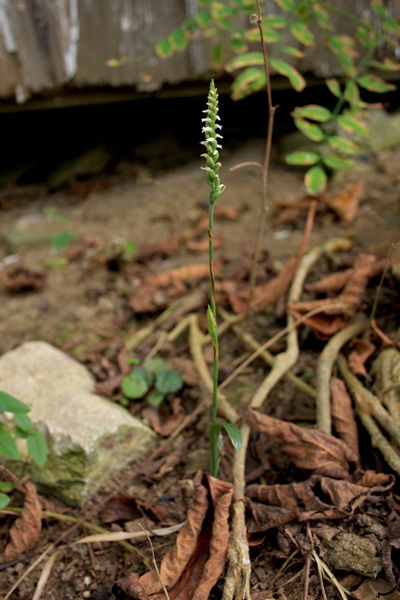
Oval ladies-tresses, Spiranthes ovalis.
(*photo credit)
November 22, 2021 Moving Ethnicity: Ethnic Atlas of the United States
Did you ever work on a puzzle off and on for almost forty years and still find it not quite finished? I prefer real puzzles and the most enduring and intriguing one was, and is, "What is the ethnicity of Appalachians?" Clues: the answer is found on U.S. decennial census reports, but even these are somewhat imperfect. In the course of finding an answer, the puzzle territory morphed into the entire nation due in part to the porous boundaries of Appalachia and the realization that the ethnicity of the entire nation is in flux. The question broadened to this one, Are we as a nation becoming more amalgamated or more diversified?
This broader and more intriguing question would have many giving one or other answer, but what is the true picture? My emerging answer is in favor of growing diversification. We compare our four sets of census data on ethnicity and racial groups for 1980, 1990, 2000, and 2010 along with information gathered from a host of other sources. Solving the puzzle began in the 1980s with a book advance from "Facts on File." For a brief period in the 1990s I was discouraged because the 1990 ethnicity picture differed so much from the decade before. The next set in 2000 clarified some of the changes, and so we awaited proof from 2010 data that verified some of the trends of the last century.
Janet Powell and Mark Spencer have helped me develop four sets of 50-state maps showing the predominant ethnic groups in each of the over 3,000 counties of the United States. We hope if time and energy permit to use ethnic data from the 2020 census when it becomes available next year. A comparison of five census sets would be unprecedented -- and awaits our work. We are not yet updating the 1980s data accumulated with visits to 25 major metropolitan areas, but these also await future comparison. Ethnicity certainly changes with time and we observe that the "English" component has decreased and the Hispanic one has vastly expanded. There is also growth in Asian American groups.
What is forthcoming is an analysis of the vast changes that occurred almost silently and without fanfare behind the mountains of statistics that make up America's changing ethnic landscape. Granted, we coupled some allied and related groups (Scandinavians, Slavic, Asian Americans, and others) when needing to contrast at local and regional levels; we clarify these on the resulting maps.
We have made the first four sets of data available on Brassica Books. However, taking a set of maps with similar parameters would allow a moving picture over five censuses and somewhat prove that both amalgamation into a component "American" designation and diversification into Hispanic, Asian American and Native American sections are occurring simultaneously. The fact is that the white population ethnic divisions are becoming less pronounced, while minority ones continue to grow. We await 2020 census data.
Prayer: Thank you, Lord, for the grace of persistence.

Connection.
(*photo credit)
November 23, 2021 Integrating Tough Love into Corrective Action
"Tough Love" occurs when a person must accept that an unpleasant option for a loved one is really the only way the person will be able to change his or her current condition. It often targets drug or other substance abusers after exhausting other remedial but unsuccessful attempts to help. From the point of view of a pastor, this is never an easy matter to discuss with either the ones desiring to execute tough love, or the target of the controversy. No one wants to do it, and yet often it must be done. Toughness is hard to advise, hard to give, and hard to receive; all agree it ought to be avoided whenever possible.
No doubt part of the problem may extend to others beyond the individual, who cannot be easily reached. Perhaps permissiveness in the past by loved ones has been excessive, and now the results are beginning to appear. Strict conditions are now hard to apply and anticipate positive results. The neutral advisor soon senses the delicate situation and is hesitant to dwell on guilt and blame -- for enough is already known. Often the partner or family of the person needing love has been too lenient when a stricter approach may have led to necessary changes in behavior. We Americans allow malpractice to occur uncontested, for a length of time to the detriment of culprits, or to others associated.
In an act of desperation for the loved one, parents will deny a careless teenager use of a vehicle, or a drug offender is denied financial assistance. It may lead to unpleasant hostility or excessive domestic conflict, or even cutting off contact with the offending party. In time, civil arrest or jail time may be part of "tough love." Consider these basic steps in such procedures:
* Pray over the matter, and do not just act from emotion.
* Initiate the action with the help of others who are regarded as solid backers of the tough love decision. "I am doing this after conferring with ----- and ----." This adds weight to the decision and makes the reaction somewhat muted, for others have become involved, but conferring with outsiders for advice could bring on strong reaction by the candidate for tough love.
* Make the decision final with no turning back -- though much depends on the history of past leniency and tolerance.
* Be confident that a threat of tough love may have positive results -- though much depends. Make it known that this is an act of love even if an unpleasant form of discipline.
* Express confidence in benefits from the tough love action and make these known at the time of application. Show compassion and love throughout the process.
Prayer: Lord, give us courage to act as administrators of tough love, and/or humility to accept it as recipients.

Fond memories of a recent Thanksgiving meal.
(*photo credit)
November 24, 2021 Appreciating Our Thanksgiving Bounty
All too often we overlook our responsibility to feed the hungry -- a prime focus on Judgment Day's questions. The hot summer day when this was first drafted two folks came to the door for food; the month was coming to an end and their food stamp supplies had run out. It strikes me that in this land of plenty no one should be without the basic essentials -- not snacks and junk foods, but basic food that yields good nutrition and a filled stomach. But why stop in this country? We are brothers and sisters to hungry people throughout the world as we are reminded by Pope Francis in Fratelli Tutti. Everyone is our neighbor.
Global food quantity. We look at food as though the stores are filled and all a person has to do is go in and buy it. But we awaken to basic economics that some folks lack money to buy high- priced foods that now adorn the grocery shelves -- and especially in this year of rising food prices. Corn for food for hungry people competes with mandated corn for fuel for our wasteful vehicles. When human needs persist and the supply to satisfy these needs dwindles, we can only expect that prices will continue to rise as people try to live on limited incomes.
Global food quality. It takes more than cracked corn to feed a hungry world. Some of this grain must be converted to protein to satisfy the complete nutritious needs of growing world young and old alike. Nutritional education is only as good as the availability of the foods to fill the hungry mouths. In fact, it takes a combination of research, education, proper economic conditions, and cultural sensitivity to satisfy these nutritional needs. For instance, soybeans can be delivered in many ways that are in keeping with cultural traditions of hungry people, but this demands available soybeans -- another item along with grain that requires ongoing agricultural production and processing.
Global food policy. A world that can supply its basic needs closer to home is a safer and more secure one. Grow food locally where possible. Too many of the world's resources are put into military hardware and infrastructure for security. Only a fraction of that one-and-a-half trillion dollar military budget could be better spent in adequately enhancing small farmer needs in Africa, Asia and Latin America. That is security! Why millionaires and billionaires when a billion people are without proper food? Why such inequality when we have the citizen's power to initiate change by electing leaders who think globally and not just satisfying their back yard? In this age of higher food prices, it is unthinkable that some want to cut food stamps while not taxing the super-wealthy. Our nation was at its finest when the rich people were taxed at 92% after the Second World War. We need Marshall Plan-type programs for the world's small food producers, but we must eliminate tax havens and untaxed incomes of the rich.
Prayer: Lord, give us a generous spirit as we thank you on upcoming Thanksgiving for the bounty we are preparing to consume.

Billowy clouds overhead.
(*photo credit)
November 25, 2021 Discovering the Power of Gratitude
We are celebrating our national Thanksgiving feast, an event that has a long history but with some folklore. However, we have learned as a nation to thank God for gifts given. If we cultivate this gratitude, we discover a saving grace for people and nation. Let's look about and find those points of special thanksgiving:
* A land committed to giving thanks on a national basis;
* Wonderfully endowed land with majestic mountains, rich forests, fertile
plains, freshwater lakes, and seashores and abundant beauty to attract
tourists;
* General religious spirit that includes thankfulness;
* The grace of a safety net and adequate food materials for our people
who suffer from lack of essentials;
* Basic awareness and quick response in times of disasters;
* A secure transportation system to allow the flow of commerce;
* An ability to communicate well with our neighbor in a dependable postal
system and through an accessible internet and electronic devices;
* An educational system highly prized throughout the world even though
costs exclude many lower-income folks from easy access;
* Freedom to speak and practice our religion in general, with some
exceptions that are being contested;
* National compassion for those throughout the world who are suffering from poor health and lack of food;
* A sense of sharing experience in governing our federated republic
with those in other lands;
* Established constitutional guarantees of racial equality, even though
infringed upon in some individual cases;
* National pride in athletic programs that strive to bring out the best in
our young people;
* Judiciary system that is generally free from corruption;
* Imperfect but dedicated health system meant for all the people that
includes emergency service for most in need;
* Ability to contest issues in a generally open and forthright manner;
* Stable financial system with low borrowing costs;
* Experienced and innovative people who can rise when conditions
demand change;
* National security in military and police forces, though we are beset by
lack of gun laws and limited ammo access;
* A national research structure that covers many critical areas of health,
food safety, and environment;
* Desire for unity and national pride;
* An imperfect history that is told honestly so we can learn from our
mistakes; and
* Dedicated national and local leadership.
Prayer: Lord, we thank you for the good things that are part of our world, but we also beg for the grace to help us use these gifts in a more perfect fashion.
Being Grateful
On this festive Thanksgiving weekend, it is fitting that the fourth Christian characteristic (along with collaboration, mercy and trust) be given special attention. Thanksgiving is an occasion to review the gifts given and our need to show gratitude.
Recall the multitude of gifts. I once listed one thousand gifts from God (A Ministry of Gratitude: One Thousand Things to Be Thankful for) on this website, but discovered later that a number of gifts had been overlooked. The listing is never exhausted, if we take time to discover and thank God for them. Some of these are quite remote and some quite subtle -- but gifts nonetheless. Without the precious gift of life, we could never have this chance to be of immense service to God's people and all creation. With the prompting of the Spirit, we can freely give thanks.
Learn to say thanks. With time this can come naturally in our expressions to our helpful neighbors and in prayer to God. This counters the tendency in life to regard many services and materials rendered as what we "deserve," because of who we are. In such an atmosphere of selfishness that pervades our secular culture, we fall naturally into the "give me more" attitude. It is a habit in our competitive surroundings to expect good things by our presence -- and if we cannot seize them, at least expect the government to secure them for us. In such circumstances, an insensitivity can be addictive and we soon forget to share gifts with needy neighbors.
Intensify our sense of gratitude. It is wise to see that being selfless in receiving gifts opens the challenge to share with those who are lacking -- and it takes insight and willingness to freely act to be saved, "You did not feed me when I was hungry." Affluence can be deadly when it becomes so immersed in material things that it consumes our attention and crowds out sensitivity to other's needs. Possession of goods deserve our own questioning: do we need these? Can I share them with others?
Teach gratitude. Some have what appears to be everything given to them, and yet never voice a "thank you." When we observe lack of gratitude, especially by complainers and the worldly, we need to gently remind them that what has been given to them is a gift from God. We do not deserve these gifts, and so it is far better mentally and emotionally to pause with a simple thanks, even after our taste or smell or hearing fades. Perhaps our nation is blessed, because we give time for Thanksgiving -- provided we make the best use of it, and not look greedily ahead to Black Friday.
Thank you, readers, for taking the opportunity to mull over this essay. Thank you, Lord, for your gift of extended life that includes the mental capacity to say sincerely "thank you," for being blessed to live in troubled times. May our gratitude perdure to the last breath of life -- along with the trust that divine mercy will extend to us and to our neighbors.

A migrating flock, heading
to the South for winter
(*photo
credit)
November 26, 2021 Recognizing Consumerism and Permissiveness
Black Friday is the day profiteers are hard at work convincing consumers to panic and buy whatever is desired -- and to always desire and buy more. A permissive people aware that their elders had to go in need during the Great Depression will do much to insulate their offspring from such conditions. For them, it could prove time to distance themselves from the recent pandemic. People bend over backwards for the materials that they found wanting when younger. For this reason, if one can obtain credit to acquire whenever a loved one whimpers, the culture responds, "give them what they ask, for we teach them well to call for specific things -- and never to be totally satisfied."
A permissive culture is one that never says "no." The discipline of fasting is far from the mind, and certainly after yesterday's feast. Unfortunately, the day of national gratitude is followed immediately by today's "Black Friday," which recasts the eyes of all on the god of materialism. The grateful souls of yesterday turn quickly to the mad rush of Christmas shopping, as though the holy name will sanctify the materialism of the rush. After midnight, some consumers line up at high ticket item sales at some shopping malls. Get them to the store for massive savings, and what they saved can be extracted from them in other displayed items. It is a national sweepstakes for the cash in the pocket.
Permissiveness is targeted to individuals who allow themselves to indulge to the degree that credit card and ready cash allows; it involves a lack of calculating costs or properly figuring present funds due to faulty math, laziness, or wishfully being willing to try to live "higher on the hog," as the old expression goes. This economic permissiveness extends to families with nagging and rather persuasive youngsters, who strive to keep up with their peers. For tranquility, individuals within the family unit are allowed additional things -- and rampant permissiveness becomes the rule.
Permissiveness goes beyond the individual stampeding buyers we witness today. It includes a nation that encourages increased consumer spending, allows underwater mortgages (until the banks start foreclosure proceedings), overlooks overdrawn bank accounts (taking a very short time to build up), and permits just about anyone to buy a thousand rounds of ammo for hunting or security. The trait of material permissiveness is directly related to our consumer economy and the implicit "patriotism" associated with buying more than one can afford or one needs -- and basing economic progress on consumer spending.
On Black Friday say "no" to excessive spending at both individual and national levels. Say "no" to a consumerism that fuels a dysfunctional economy. To refrain from shopping today is a mark of understanding the gratitude shared yesterday. Stay home.
Prayer: Lord, teach us to say "No," not only to things that hurt us, but to any excess of good things as well.

A sky that speaks of winter
(*photo
credit)
November 27, 2021 Curbing Over-Consumerism
During this Saturday after Thanksgiving let's reconsider our purchasing habits. If 70% of the American economy depends on consumer purchases, it may mean we ought to be all the more hard-nosed about what we consume, as well as try to redirect that economy to more services for the needy, unskilled, and disabled.
1. Avoid "window shopping." The fact is that we are plagued with tens of thousands of advertisements in the course of a year. It is hard to count because we do not give attention to many -- but we ought to have still greater "modesty of the eyes."
2. Ignore a flashing "save" sign. This is not a saving, but an allurement to spend on an adjacent item. If we could save so much, why is there a consumer indebtedness of trillions of dollars?
3. Decide what is needed. Too often buying is a free hand to possess something and then finding an excuse (gift for relative or friend) to make the purchase. Have in mind what you intend to buy, and make sure that it satisfies your immediate need.
4. Halt impulse buying. We hear or see a new product (domestic or foreign) and are drawn to buy it for some immediate reason, or just because it seems a good deal. The best advice is to wait one week or one month and review the reasons for such a purchase. Perhaps the impulse to buy has evaporated -- and shouldn't have been entertained in the first place.
5. Think twice. We are just at the point of buying something and ought to ask ourselves -- Is this really needed? What if it isn't what it is claimed to be? Will we regret the purchase?
6. Be critical among others. We most likely have a heap of bad or less than perfect purchases around. Had an expert suggested not to purchase this or that item, would we have listened? Do we ever ask potential consumers whether they really need or simply want this item? Is there peer pressure involved in seeking this purchase? Are you willing to say "Don't be fooled"?
7. Be critical with self. Have we learned from the experience of a hasty purchase, whether a small item or a house or automobile? Most of us hesitate to admit such mistakes, for consumers are possessed with a self-righteous "knowledge" of what is best for them. Do we use the excuse that the discards will go to charity?
8. Recycle a bad purchase. If you can't return the bad buy, please don't just pass it off on a passive neighbor. This perpetuates excessive consumerism. Be creative in a new use and let it be a reminder that such will not happen to us again.
Prayer: Lord, teach us how insatiable materialism will grow on us, if we do not take disciplinary steps. Help us act responsibly when it comes to living a simple lifestyle.
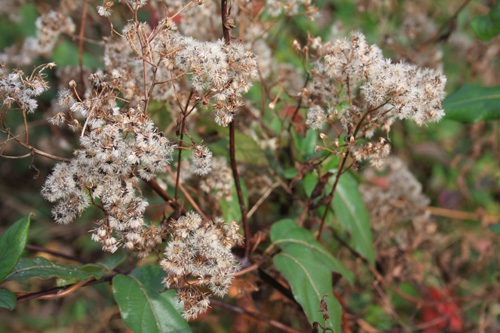
Remnants of the white snakeroot, Ageratina altissima
(*photo
credit)
November 28, 2021 Reflecting on Kairos, Chronos, and Advent
The Greeks had two words for time: "Kairos" or the opportune moment; and "Chronos" or the time we measure by the clock as sequential time. For many of us, we designate our time as that hum-drum flow from day-to-day punctuated by timely events that stand out in unforgettable fashion -- the nodes in our symphony of life. Special events include Kairos moments when important decisions are made, or at least offered. These special Kairos moments can be neglected or deliberately refused, for we are capable of passing up grand opportunities. Kairos is this broader NOW that exceeds the passing moments of the ticking clock. We are aware of this precious present moment so different from our past and future, and yet both separating and connecting them into a life experience. NOW we must address the impact of global warming that is HERE -- if WE only act responsibly at this time. "Reclaiming the Commons" is a global Kairos event.
For Christians, we approach the Advent season when we celebrate the Kairos moment of world history, the coming of Christ into our midst. However, this advent of Christ was an historic event in calendar time, and yet it remains eternally an opportune invitation for us to receive this coming into our own hearts. It is a Kairos always present in chronological time. We enter into this spiritually significant event and can respond in ever deepening levels of commitment. Here we are invited into an eternal NOW -- and must proclaim it as such.
In Sacred Journey, Susan Corso calls Kairos "holy" time. While most of what she says about taking advantage of moments for retreat is well said, one could differ on what is "holy." Yes, the busyness of daily life is measured in Chronos, but so can the restful moments. "Rest" as space between times of work is measured by a clock, but the rhythm of rest and work is both Chronos and Kairos. This symphony of life needs periods of rest and action, of which is included retreats on an annual or periodic basis. Our spiritual balance is working towards holiness that rests throughout the process. Responsible adjusting of the process often comes during retreats, and so it has a spiritual housekeeping function -- but our work life and rest periods are both integral parts of our journey to holiness.
Within this life journey we have many moments of opportunity, possibilities for a better future informed by past experiences. Retreats are necessary, but hardly more holy than putting courageous decisions into effect in our working day. Implementing decisions in a busy world is part of continual prayer. Kairos are moments when the Spirit speaks freely to us, and we should always be listening and willing to respond in our continued conversation. Holiness is in the journey, and that is just as important as the restful interludes, both part of the essence of life's symphony.
Prayer: Lord, make us aware that this Advent contains the Kairos moments needed for carrying on our life's journey.

A colony of winged ants, sensing the chill of
autumn
(*photo
credit)
November 29, 2021 Balancing Physical and Spiritual Needs
Some seek a comforting prosperity religion that gives them affirmation that what they are doing is proper in cultural expectations; this materialistic religion reinforces the drive for material prosperity; the minister is an example of success with growing congregations, diamond rings, and private jets. If the followers are good, they can become like the leader and have material success. It is a sort of shell game and those in poverty are often tempted to play it. The offer to avoid a bad situation seems most enticing and the goal of wealth lies ahead, along with the blessing of upward mobility and all its privilege.
Sometimes the goals of the poor go beyond a tarnished "American Dream," or the fading hope of winning a jackpot. An alternative and better-balanced spiritual goal is to find strength in solidarity with others and see the goal as more than individual; it includes the society in which one lives. This includes working together to help obtain what ought to be coming to the poor. That is better than going hat-in-hand to beg from the wealthy and express gratitude for the little given. Hopefully, essential food and lodging can be attained through solidarity and cooperative endeavors for the group and not the individual. Here spirituality takes on a deeper definition of omitting the tendency towards individual physical wants (insatiable materialism) and still directing actions to physical needs sufficient to keep body and soul together for ALL people -- not just the privileged few.
A "spirituality" that advocates patience for the poor and yet does not show impatience to the overly affluent is lacking, and merely the handmaid of the god of prosperity religion. The effort to allow goods to trickle down is inadequate, for it is wishful thinking. That is a perverse form of spirituality, for it rests on the god of prosperity giving status to some being individually successful. Pay the false prophet enough and you will become successful. Prosperity religion becomes more difficult to believe during rough times like these, for lone individuals do not have the answer. We need the support of others.
Authentic spirituality involves a community, and one acting in a non-violent fashion. The group security and progress depend on obtaining essential needs for all, and success rests in doing this action in solidarity with others. Jesus encourages us to unite; he teaches, heals, forgives sins, and drives moneychangers from the temple commons; these are examples for his apostolic body. Jesus wants us to be active participants in initiating the reign of God here on Earth and not patiently awaiting a future happening. The sacramental life energizes us to act; the Spirit inspires us; the way of Christ involves reaching out and meeting and balancing all human needs, physical and spiritual.
Prayer: Lord, as Advent approaches give us a balanced outlook for reducing the uncontrolled demands to satisfy individual wants, and to recognize the authentic needs of people everywhere.
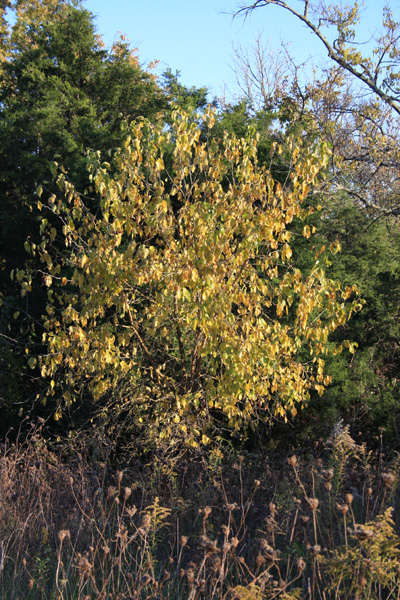
A Kentucky autumn scene.
(*photo credit)
November 30, 2021 Protecting the Commonwealth from Billionaires
Americans with capitalistic tendencies champion the "right" of the wealthy to retain their privileges; these same folks do not realize how harmful excessive wealth can be to a democratic society where some lack the essentials of a balanced life. Our nation's founders held that all rights come from God. However, these rights do not grant special privileges to those who have an unusual share in a limited pie. Pies do not grow indefinitely as some materialists believe, for material resources are inherently limited. Conflicts over right to property versus right to essentials should always favor the latter. The government as arbiter in such disputes must rightfully favor the powerless.
The commonwealth is a technical term applied to certain nations (British or Russian Commonwealth) or to certain of the United States (Kentucky, Massachusetts, Pennsylvania, and Virginia by designation and Delaware and Vermont within their constitutions). The designation does not set these states apart, but rather emphasizes that government is based on the common consent of the people. Wealth is really the public welfare, the res publica of Roman times. With evolving democracy, this means that a "public arena" is where Commons is shared, not privatized.
Why an American issue? Because if privatized wealth buys nominations and elections, our very democratic system will be uprooted. Ben Franklin feared this might happen. Never before in our history has the stark reality of a democratic principle of essential rights of people having precedence over rights of private property (no matter how acquired) been so highly challenged as with this growing state of inequality today.
The "divine right" of billionaires is a horrifying myth that would have unsettled certain ones of our founding fathers. Even if we conceded that certain individuals "earn" that wealth -- and this is highly disputed -- it does not mean they have a right to retain what should be part of the Commons. When our public welfare is threatened by private autocrats, the citizens as true protectors of the Commons have a right to remove and redistribute this wealth for the good of all. Interestingly, this is a basic concept of common law and Christian (and others) concepts that go far back into history. As defenders of the commonwealth, we question the rights of billionaires to retain and politically use their however-gotten "property." This harks us back to the true meaning of democracy.
Defend the Commons. We the people must defend the liberties that were won at such a high price of human sacrifice. Private individuals feel they are blessed by God and privileged to control their accumulated wealth as they see fit. Not so, and citizens must speak out on this issue, for wealth belongs in the Commons; members of designated "commonwealths" should be the first to speak.
Prayer: Lord, give us the courage to face our current problems and discover as dutiful citizens meaningful means of response.
|